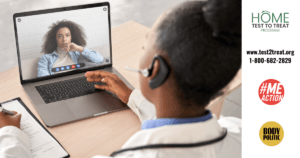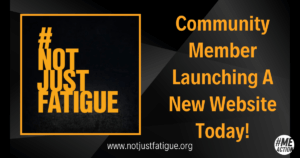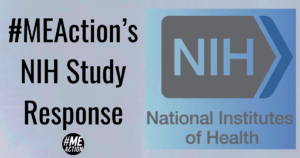On 25th May 2018, NICE held an engagement workshop with stakeholders, looking at the draft scope for the new guideline on ME/CFS. This is the second workshop held by NICE in which stakeholders were given a chance to influence the development of the new guidelines. The draft scope will be amended based on this workshop and then sent back out to all stakeholders for final comments. At the same time they will start recruiting members for the Guideline Development Group (GDG), which will be tasked with writing the new guideline.
#MEAction UK was represented by Nathalie Wright and Carolyn Leary, both volunteers. We would estimate there to be around a 50:50 split between patient/carer representatives and professionals. The workshop opened with an introductory presentation by staff at NICE, explaining the aims of the workshop and the NICE process and then an introductory speech by Dr Peter Barry who has been appointed as the chair of the guideline development group and a hello from Dame Llora Finlay, the vice chair.
The main part of the meeting, lasting more than 1.5 hours, was a discussion conducted at tables of around 12, including two people from NICE’s staff acting as facilitator and minute-taker. Each table worked through the first draft of the scope, exploring issues as they came up.
A very important point for us, and the patients we asked via social media, was for greater focus on objective outcomes – not just in reviewing evidence but also in measuring clinical outcomes such as physical functioning. This seemed to be a common theme amongst patient/carer representatives, and it felt like we put forth a very unified position here.
The point we felt was most conspicuously missing from the draft scope was any mention of harm, and we argued strongly that harm should be included as a main outcome when searching and assessing evidence. At one table the NICE representative fed this back when summing up key points from the discussion.
It was encouraging that NICE seemed keen to consider the whole guidelines for severe patients and children respectively. Also discussed was how to effectively include severe patients as part of the committee – a crucial question for all stakeholders. It was suggested there could be a subcommittee of severe patients. Making engagement with severe patients accessible needs very careful consideration.
It was noted that very few professionals have substantial experience treating severe patients or any understanding of the reality of severe ME. Reflecting the needs of severe patients is of extreme importance and stakeholder input will need to be very substantial in this area, as stakeholders have more expertise here than most professionals.
We also had general concerns about the language used throughout the draft scope, which doesn’t reflect the devastation caused by this disease. The draft scope states, “People with ME/CFS commonly report a lack of understanding among health and social care professionals about their illness and related problems.” But this is a dramatic understating of the belittling attitude and downright disregard that patients face from many professionals. We asserted that stronger language should be used throughout, as it is in scoping documents for other diseases.
Another point many patients brought up with our volunteers was why the Lightning Process was even mentioned when biomedical treatments are entirely excluded. We specifically asked NICE staff about this, pointing out that the Lighting Process is highly unethical and the research seriously flawed. Every patient/carer was deeply concerned that pseudoscience such as this could be given any airtime.
NICE staff responded that they had to consider it as there is a published study, whilst strongly suggesting this would be a negative recommendation. We understand the need to include and review all evidence (even bad evidence) to make an informed opinion, but we hope that NICE also makes efforts to include the critiques and reanalyses of studies so that they are reviewed with the appropriate context and a critical eye.
Overall it felt like NICE have acknowledged and changed their practices since the 2007 guidelines were created, specifically stating that “we don’t look at evidence in the same way that we did back then”. The facilitators definitely seemed to listen and were able to summarise points from around the tables well. These are positive steps to winning patient trust, and NICE must be commended for this (especially because, as they joked at the session, they aren’t used to receiving praise!).
However, there remains a tangible disconnect between patient/carer representatives and professionals. When Carolyn asked her table who knew of someone who had been harmed by GET, every single patient/carer representative put their hand up yet none of the professionals did. This is despite the patient/carers all coming from different parts of the UK, and stands in stark contrast to Geraghty 2017, where 54-74% of patients deteriorated after a course of GET.
One of the therapists professed shock at the stories being told, but denied it happened in their own clinic (despite reports from patients to the contrary). A different professional thought actometers were a great idea when suggested by a patient, yet we were shocked this appeared to be the first time they had even considered such an objective test was possible.
Another clinician nodded and agreed with patients throughout the process, yet at the end said the guideline development group absolutely must have a psychiatrist – it seemed this professional had only attended to make this point.
NICE currently propose that the GDG includes two GPs, three physicians interested in ME/CFS (e.g. neurologist, infectious disease, immunologist), one psychologist, one occupational therapist, one physiotherapist, one dietician or nutritionist, two paediatricians, one nurse with special interest, one social worker and four lay members to include parent and/or carer. We see no reason to specifically include a psychiatrist, when neurologists and immunologists are only optional.
It’s evident that objective measures are one of the ways NICE can fulfil its public duty to the many citizens disabled by ME. There is a lack of proper tools to measure the efficacy of any treatment and there are few ways to record harm at present. This may be a way to quantify both. Many patients are discharged from clinics if it seems they are unlikely to improve from CBT or GET, and the Yellow Card system will not log psychological or behavioural treatments. But introducing clear measurements of improvement and deterioration makes clinics more accountable and more efficient.
Although we came away feeling like we had been listened to, we have no idea if we were heard; the proof will be in the pudding. The circumstances of the meeting were inadequate: there was not enough time for stakeholders to react to the draft scoping document in preparation for the meeting and there was not enough time in the meeting for stakeholders to put across their input. Many stakeholders also felt that the draft scope was inadequate and had not taken into account enough of the stakeholder input from the initial meeting (pre-scope). However, being despondent at shortcomings is not an option. Going forwards, it is important to keep an open dialogue with other stakeholder organisations; if we can unite behind key points we are stronger.
We have a short period of respite before the next stage. The revised draft scope will be sent to all stakeholders on the 21st June, with a consultation period running until 19th July asking for written submissions. Our volunteers will be working together to write this but any input is welcome. Get in touch on social media or email [email protected]
Committee member recruitment will also happen during this time, so if you are thinking of putting yourself forward to be on the guideline development group do consider getting in touch.

Home Test To Treat: Access Free Home Telehealth for Flu & COVID-19 Infections
#MEAction and Body Politic* are excited to collaborate with Home Test To Treat to share their critically important resource! Acute COVID-19 treatment and testing is unfortunately becoming harder and harder to access with the U.S. government public health emergency having been declared ended. The Home Test To Treat pilot program is a way to fill




